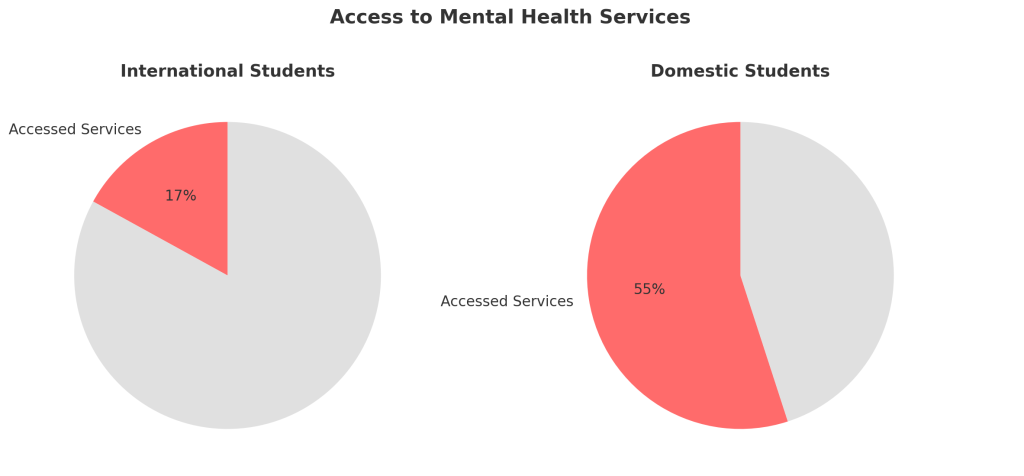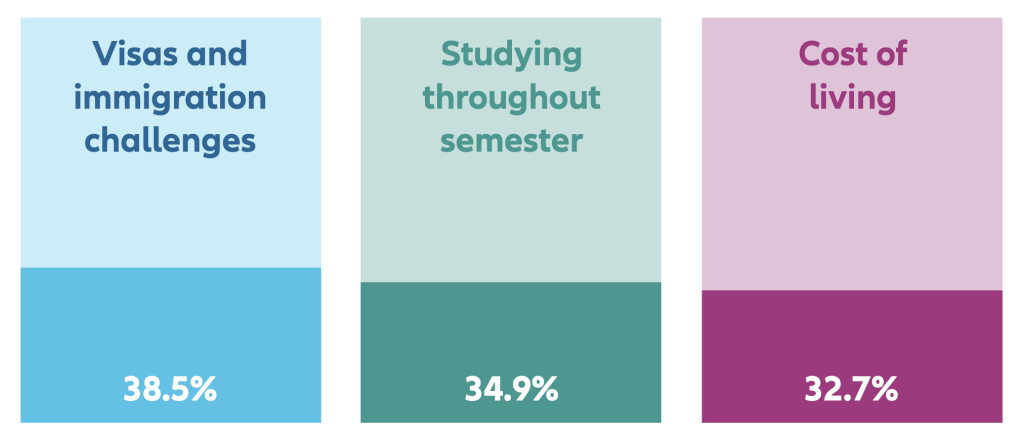
International students in Australia are facing a significant mental health crisis, with the population now exceeding one million.
A systematic review of 19 studies on international students in Australia reported anxiety rates ranged from 2.4% to 43%, while depression was found in 3.6% to 38.3% of students. Psychological distress was reported by 31.6% to 54% of participants. Meanwhile, 5% to 18% of international students had suicidal thoughts, and 1.2% to 2.2% attempted suicide.
However, only 17% of international students had accessed a mental health service, compared to 55% of domestic students.

Why are international students struggling?
Street interview about international students’ mental health. Video From: YouTube: Doris YU: All Rights Reserved.
Harry is from China. He studied medicine at the University of Technology Sydney (UTS) and the University of Sydney (USYD), and now works at a hospital in Sydney after graduating in 2023.
He sees financial stress, academic pressure, housing issues, and language barriers as key reasons for mental health problems among international students.
“We’re here alone, far from family support,” he adds. “Back when we were in school, many of my friends faced depression, anxiety, or loneliness.”
Just like Harry observed, the causes behind international students’ mental health issues are complex.
Culture Shock
Many international students experience culture shock.
While domestic students face stressors in tertiary education, international students face the additional pressures of transition and integration. Unfamiliar academic environment, English language challenges, and different teacher–student dynamics often contribute to anxiety, as they try to find a balance between adjustments to the new culture while maintaining connectivity with their home culture.
Multiple Stress
International students face triple pressures from visa, academic, and financial challenges, and almost 1 in 3 experience stress often or always.

Amy is from Vietnam and currently studying business at USYD. She is experiencing a mental health crisis.
“I have experienced stress and anxiety,” she said. After changing major, she has undergone a heavier course load with particularly challenging subjects. At the same time, she works 20 to 24 hours a week to cover her living expenses.
“Balancing both responsibilities has been overwhelming,” she added. “Both mentally and physically.”
Loneliness and Insecurity
International students often struggle with loneliness and a low sense of belonging, with 60% to 65% reporting feelings of loneliness or isolation.
Yifei, also from China, is currently studying psychology at USYD. She has experienced anxiety.
She said, “I don’t have many friends here in real life, so I can only talk to my online friends. I feel extremely anxious because I am so lonely.”
She added, “I don’t express myself much or actively seek help. I want to be noticed, but I don’t know how. I think a lot of students are just like me.”
Additionally, racism or discrimination has further compounded this sense of alienation and insecurity. Up to 50% of international students have experienced discrimination and safety problems.

What stops international students from seeking help?
International students are significantly less likely to access university counseling services, but why?
Language Barrier
The language barrier is a major reason.
Students may find it hard to express emotions or mental states in English. For example, the differences between the terms “stress,” “anxiety,” and “depression” may be difficult to articulate for a non-native speaker.
Yifei feels the same. She believes that it would be more comfortable to speak in one’s native language when facing mental health problems.
When asked what advice she would give to international students going through a mental health crisis, she said: “Please hang in there until the holidays, then you can go home and see a therapist.”
Stigma
In some cultures, mental health remains a taboo topic.
Some students worry that admitting to mental health issues could affect their academic record or visa status.
At the same time, some students think that mental health services are “only for mentally ill students.” Others recognize their symptoms as fatigue or feeling unwell.
Amy said she has noticed that the university actively promotes mental well-being and encourages students to take care of their mental health. However, she has not used any of the available mental health services. She said, “It hasn’t crossed my mind to seek support before, which is why I haven’t taken that step yet.”
Unawareness
Some students don’t even know that their university offers counseling services, or don’t know how to access them.
Harry had once experienced anxiety as a student, but he usually coped with it by playing video games. He said, “If I had known that the university provided professional mental health services, I probably would’ve sought help from a psychologist.”
How Should Support Look?
Research has found that Australian universities do not provide sufficient support for international students. Only three publicly available mental health strategies across Australia’s 40 universities contained substantial references to international students.

Harry also believes that mental health support for international students is generally lacking: “The university never promoted its mental health services, so many international students didn’t even know they existed.”
In the interview, Amy offered some suggestions for how universities could better support international students’ mental health.
She said, “Universities could do more by offering tailored mental health support specifically for international students, such as culturally sensitive counseling, language support, and workshops that address the unique challenges of studying abroad.”
Furthermore, based on surveys with students, here are some other suggestions for universities:
- Improve Access to Mental Health Services
Universities should expand the availability of counseling services and ensure there are enough sessions and students can book appointments easily.
Besides, they should also offer more services tailored to international students, e.g., workshops, consultations or psychology services.
- Raise Awareness and Visibility
Researchers suggest that universities often provide too much information too early, which students are unlikely to retain.
Therefore, mental health resources must be better publicized through ongoing and campus-wide programs throughout the semester.
- Addressing Stigma Around Mental Health
Universities should actively reduce the stigma around mental illness and emotional struggles through more public-facing events.
- Foster Social Belonging and Peer Connection
Universities should help international students connect with others outside of class and build friendships, especially with domestic students.
- Design Inclusive Learning Environments
Smaller and more stable tutorial groups, along with more collaborative learning, can foster a stronger sense of community and belonging.
In conclusion, if universities truly want to support international students’ mental health and well-being, they must move beyond reactive measures and adopt a proactive, culturally responsive, linguistically accessible, and actively promoted approach instead of just listing it on the website and O’week flyer.





Be the first to comment